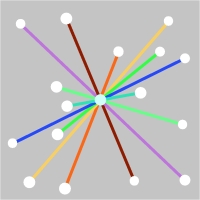Dewey Decimal Classification (DDC)
The American Dewey Decimal Classification (DDC) is the world's most widely used library classification system. Over 135 countries worldwide use DDC, over 60 countries use DDC numbers in their national bibliographies.
The "Dewey" in the classification's name stands for the name of Melvil Dewey, a library pioneer who invented the system in the 1870s. In those days, his work helped the old-fashioned librarianship becoming a modern and academical profession. The "Decimal" in the classification's name refers to the notational system used for the numeral description of DDC classes.
Since 1988 the DDC is owned by OCLC (Online Computer Library Center Inc.). Support in developing and maintaining the DDC is given by the Library of Congress (LoC) in Washington, D. C. Every year, over 110.000 DDC numbers are assigned to works during the LoC cataloging process.
A German edition of DDC 22 was released in October 2005 as printed book published by K. G. Saur, and in addition as online version named MelvilSearch and MelvilClass offered by the German National Library. The terms of use of German Melvil services are available under http://services.ddc-deutsch.de/.
External links:
- dewey.info – linked data version of the DDC Summaries in ten languages
- OCLC's Dewey services site with facts and news on the DDC
- The Dewey blog with examples and explanations for DDC numbers and their use
- Dewey Decimal Classification glossary
- OCLC DeweyBrowser
- German National Library web pages on the DDC Deutsch translation project (German)
- Description and links of the online services MelvilClass and MelvilSearch (German)
- Touring DDC exhibition: DDC-Dachs (German)

